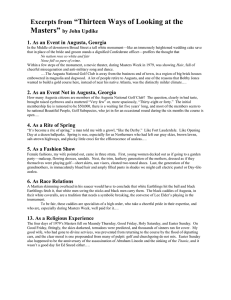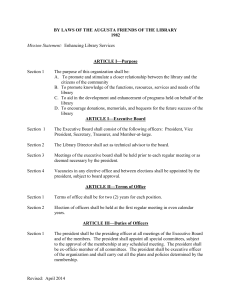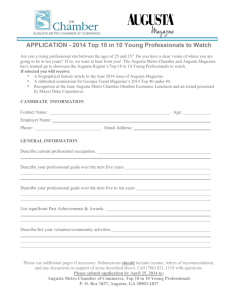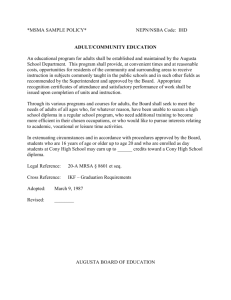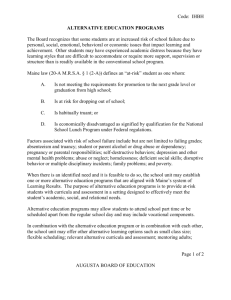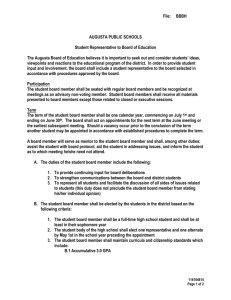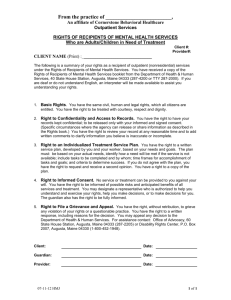1 . Make a List. Glocalization Project
advertisement
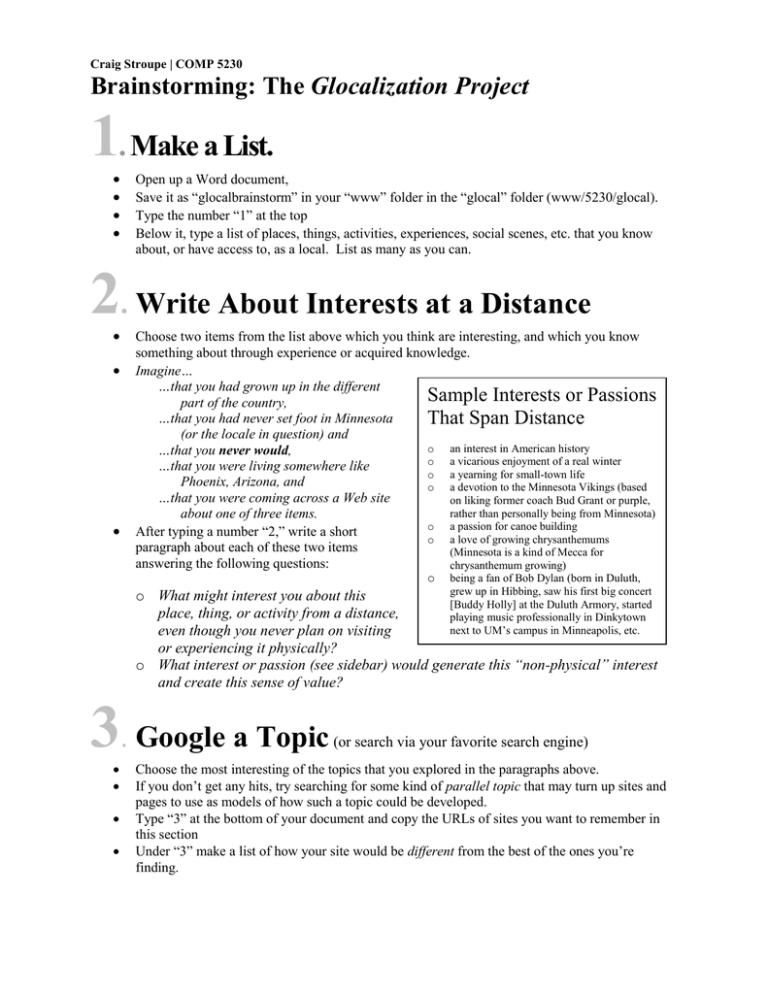
Craig Stroupe | COMP 5230 Brainstorming: The Glocalization Project 1. Make a List. Open up a Word document, Save it as “glocalbrainstorm” in your “www” folder in the “glocal” folder (www/5230/glocal). Type the number “1” at the top Below it, type a list of places, things, activities, experiences, social scenes, etc. that you know about, or have access to, as a local. List as many as you can. 2. Write About Interests at a Distance Choose two items from the list above which you think are interesting, and which you know something about through experience or acquired knowledge. Imagine… …that you had grown up in the different Sample Interests or Passions part of the country, …that you had never set foot in Minnesota That Span Distance (or the locale in question) and o an interest in American history …that you never would, o a vicarious enjoyment of a real winter …that you were living somewhere like o a yearning for small-town life Phoenix, Arizona, and o a devotion to the Minnesota Vikings (based …that you were coming across a Web site on liking former coach Bud Grant or purple, rather than personally being from Minnesota) about one of three items. o a passion for canoe building After typing a number “2,” write a short o a love of growing chrysanthemums paragraph about each of these two items (Minnesota is a kind of Mecca for answering the following questions: chrysanthemum growing) o being a fan of Bob Dylan (born in Duluth, grew up in Hibbing, saw his first big concert o What might interest you about this [Buddy Holly] at the Duluth Armory, started place, thing, or activity from a distance, playing music professionally in Dinkytown next to UM’s campus in Minneapolis, etc. even though you never plan on visiting or experiencing it physically? o What interest or passion (see sidebar) would generate this “non-physical” interest and create this sense of value? 3. Google a Topic (or search via your favorite search engine) Choose the most interesting of the topics that you explored in the paragraphs above. If you don’t get any hits, try searching for some kind of parallel topic that may turn up sites and pages to use as models of how such a topic could be developed. Type “3” at the bottom of your document and copy the URLs of sites you want to remember in this section Under “3” make a list of how your site would be different from the best of the ones you’re finding. Why this is important: Your site needs a reason to exist, rather than just repeating, recycling or linking to already existing pages. It needs to distinguish itself somehow, not by being bigger or more expensive looking, but by having, for instance, a distinct focus or viewpoint. 4. Cluster on this topic . A. On a blank sheet of paper (with a pencil or pen) or on the site <http://www.bubbl.us>, spend about five-to-eight minutes clustering on your tentatively chosen topic from the point of view of the distanced audience How to Cluster 1. 2. B. After five-to-eight minutes, stop clustering and try writing a sentence or statement down that expresses something interesting or important about your topic from among the thoughts that came to you as you clustered. C. Back in your Word document, type a “4” and make a list of (additional) things you’d need to create the site you’re imagining: information, pictures, ideas, etc. Try to obtain these for next class meeting. 3. 4. Put a word or phrase in the middle of the paper and draw a circle around it. Then free associate by putting down more words and phrases arrayed around that topic, each in a bubble which is connected with lines to the thought that inspired it. Continue adding and extending branches to this cluster for five to eight minutes Once you’ve got lots of bubbled thoughts down, try finding connections around the outside (or through) the cluster to connect the various chains of thoughts. D. Resave your Word document. 5. Define a Topic and Angle Type a number “5” Try making an “As…” list in the style of Updike’s essay which identifies many possible “angles” on your topic which would interest your non-local audience. Bold your best topic/angle Best Topic/Angle: In a phrase, express exactly 1. what your local topic is 2. how you’re going to develop it to appeal to a passion/interest of a audience who will never set foot in your location. Example: “The Masters Golf Tournament as a Study in Turf Building” Angles The writer John Updike wrote a short essay called “Thirteen Ways of Looking at the Masters,” in which he developed thirteen different perspectives on the Masters golf tournament. (He got the idea from Wallace Steven’s poem, “Thirteen Ways of Looking at a Blackbird.”) Updike’s challenge is to write 13 different mini-essays about the same topic. His sections include: 1. As an event in Augusta, Georgia 2. As an Event Not in Augusts, Georgia 3. As a Study in Green 4. As a Rite of Spring 5. As a Fashion Show 6. As a Display Case for Sam Snead and Arnold Palmer 7. As an Exercise in Spectatorship 8. As a Study in Turf Building 9. As Demography 10. As Race Relations 11. As Class Relations 12. As a Parade of Lovely Golfers, No Two Alike 13. As a Religious Experience. Excerpts from “Thirteen Ways of Looking at the Masters” by John Updike 1. As an Event in Augusta, Georgia In the Middle of downtown Broad Street a tall white monument—like an immensely heightened wedding cake save that in place of the bride and groom stands a dignified Confederate officer—proffers the thought that No nation rose so white and fair None fell so pure of crime. Within a few steps of the monument, a movie theater, during Masters Week in 1979, was showing Hair, full of cheerful miscegenation and anti-military song and dance. ….The Augusta National Golf Club is away from the business end of town, in a region of big brick houses embowered in magnolia and dogwood. A lot of people retire to Augusta, and one of the reasons that Bobby Jones wanted to build a gold course here, instead of near his native Atlanta, was the distinctly milder climate…. 2. As an Event Not in Augusta, Georgia How many Augusta citizens are members of the Augusta National Golf Club? The question, clearly in bad taste, brought raised eyebrows and a muttered “Very few” or, more spaciously, “Thirty-eight or forty.” The initial membership fee is rumored to be $50,000, there is a waiting list five years’ long, and most of the members seem to be national Beautiful People, Golf Subspecies, who jet in for an occasional round during the six months the course is open…. 4. As a Rite of Spring “It’s become a rite of spring,” a man told me with a growl, “like the Derby.” Like Fort Lauderdale. Like Opening Day at a dozen ballparks. Spring is was, especially for us Northerners who had left our gray skies, brown lawns, salt-strewn highways, and plucky little croci for the efflorescence of azaleas…. 5. As a Fashion Show Female fashions, my wife pointed out, came in three strata. First, young women decked out as if going to a garden party—makeup, flowing dresses, sandals. Next, the trim, leathery generation of the mothers, dressed as if they themselves were playing golf—short skirts, sun visors, cleated two-toned shoes. Last, the generation of the grandmothers, in immaculately blued hair and amply filled pants in shades we might call electric pastel or Day-Glo azalea. 6. As Race Relations A Martian skimming overhead in his saucer would have to conclude that white Earthlings hit the ball and black Earthlings fetch it, that white men swing the sticks and black men carry them. The black caddies of Augusta, in their white coveralls, are a tradition that needs a symbolic breaking, the converse of Lee Elder’s playing in the tournament. To be fair, these caddies are specialists of a high order, who take a cheerful pride in their expertise, and who are, especially during Masters Week, well paid for it…. 13. As a Religious Experience The four days of 1979’s Masters fell on Maundy Thursday, Good Friday, Holy Saturday, and Easter Sunday. On Good Friday, fittingly, the skies darkened, tornadoes were predicted, and thousands of sinners ran for cover. My good wife, who had gone to divine services, was prevented from returning to the course by the flood of departing cars, and the clear moral is one propounded from many of pulpit: golf and churchgoing do not mix. Easter Sunday also happened to be the anniversary of the assassination of Abraham Lincoln and the sinking of the Titanic, and it wasn’t a good day for Ed Sneed either….
